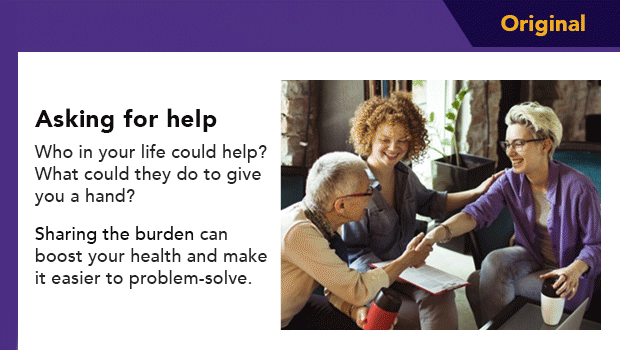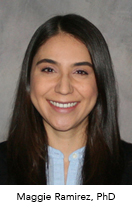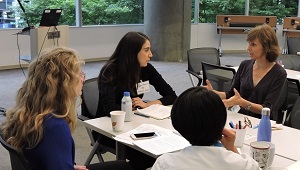Latino families inform training for caregivers of people with dementia

Screenshots from STAR-VTF showing changes before and after input from Latino study participants.
Maggie Ramirez, PhD, and Robert Penfold, PhD, culturally adapt an evidence-based online program
Local Latino families are helping researchers expand a training program for people who care for family members or friends with dementia.
The STAR-Caregivers Virtual Training & Follow-up (STAR-VTF) program is for caregivers of people with dementia who may be frustrated with the behavior changes that can develop with the condition. For example, their loved ones may get easily agitated or refuse to eat or bathe. STAR-VTF provides online training and personal coaching on dealing with these challenges. In addition to information about dementia, caregivers learn strategies for effectively communicating with someone with dementia, setting realistic expectations, and finding activities to enjoy together. Kaiser Permanente Washington currently has a clinical trial of STAR-VTF directed by Kaiser Permanente Washington Health Research Institute (KPWHRI) Senior Investigator Robert Penfold, PhD.
 But STAR-VTF was developed and tested mainly among white non-Latino caregivers, said KPWHRI Affiliate Investigator Maggie Ramirez, PhD, who studies health disparities. She is a former KPWHRI CATALyST scholar, and is now the William L. Dowling Endowed Professor in the University of Washington Department of Health Systems and Population Health. "Latinos are one-and-a-half times more likely to have dementia than non-Latino whites," she said. "But they're underrepresented in dementia research including intervention development."
But STAR-VTF was developed and tested mainly among white non-Latino caregivers, said KPWHRI Affiliate Investigator Maggie Ramirez, PhD, who studies health disparities. She is a former KPWHRI CATALyST scholar, and is now the William L. Dowling Endowed Professor in the University of Washington Department of Health Systems and Population Health. "Latinos are one-and-a-half times more likely to have dementia than non-Latino whites," she said. "But they're underrepresented in dementia research including intervention development."
Asking Latino families
Ramirez led a study that adapted STAR-VTF for Latino communities. In addition to offering the program in Spanish as well as English, the research team asked 30 caregivers of people with dementia who self-identify as Hispanic or Latino — including several Kaiser Permanente Washington members — how to make STAR-VTF reflect values and preferences of Latino families. "We had ideas about what areas we might need to adapt, based on earlier research," said Ramirez. "We know it's not enough to just translate materials into Spanish and, sure enough, that's what we found."
An issue that came up in interviews for Ramirez's study that was also described in previous research is the common perception that someone with dementia is "crazy." This stigma makes people reluctant to discuss their relative's dementia, even with health care teams. Ramirez's team also interviewed 14 providers of clinical care and social services who confirmed this problem. In response, Ramirez and colleagues added a module to STAR-VTF with more information about dementia. "We explain that a person with dementia acts the way they do because they have a disease in their brain that makes them do unusual things," Ramirez said. "We say it's OK to share with providers about what's happening at home."
Words matter
A critical discovery by Ramirez and colleagues was that some words and phrases used by researchers to describe caregivers and dementia symptoms can be confusing, offensive, or culturally inappropriate. "Burden" was particularly disliked. "Family members shared the impact of caregiving on their physical health and wellbeing," said Ramirez, "but didn't use that word and some even said not to use it." "Burden" implies caregiving is an unwanted obligation, the study notes, instead of a responsibility in line with Latino cultural values about families. In response, the adaptations to STAR-VTF include changing the phrase "sharing the burden" of care to "having another person help." (The screenshots above illustrate this change.)
Other adjustments made the training more relevant for Latino families with multigenerational households. In one STAR-VTF training example, a sole caregiver considers hiring someone to help keep his wife, who has dementia, from wandering while he does laundry. In the adapted STAR-VTF, the caregiver plans to do chores when other household members are around to help with care.
Testing and trials
Ramirez is now working with 20 Latino caregivers, some continuing from the interview phase of the study, to test the adapted STAR-VTF training and make further changes. The next step will be a more formal pilot-test of the adapted training program. "I'm so grateful for the generosity of the caregivers and their willingness to provide feedback," said Ramirez. "They were enthusiastic about the program and happy that we sought their expertise."
 At Kaiser Permanente Washington, Penfold's trial of the original STAR-VTF training program randomly assigned 67 people caring for someone with dementia into 2 groups. One group takes the 6-to-8-week STAR-VTF training with coaching calls from a trained social worker. The other, the control group, receives educational materials about dementia. The study will determine if STAR-VTF improves caregivers' self-confidence about caring for the person with dementia and their own physical and mental health compared to the control group. The study will also estimate costs to the health care organization of providing STAR-VTF and the impact on health care use, such as urgent care visits.
At Kaiser Permanente Washington, Penfold's trial of the original STAR-VTF training program randomly assigned 67 people caring for someone with dementia into 2 groups. One group takes the 6-to-8-week STAR-VTF training with coaching calls from a trained social worker. The other, the control group, receives educational materials about dementia. The study will determine if STAR-VTF improves caregivers' self-confidence about caring for the person with dementia and their own physical and mental health compared to the control group. The study will also estimate costs to the health care organization of providing STAR-VTF and the impact on health care use, such as urgent care visits.
"We're cautiously optimistic that STAR-VTF will help caregivers feel more confident and less stressed," said Penfold. "A key question is finding the optimal time to offer STAR-VTF, when caregivers begin to be stressed by their family member's behavior and can benefit most from the training."
Ramirez and Penfold's coauthors are Chester Pabiniak and Kelly Hansen from KPWHRI, and Miriana Duran and India Ornelas from the University of Washington. Funding was from the Agency for Healthcare Research and Quality, the Alzheimer’s Association, and the National Institute on Aging. The original STAR caregivers intervention was developed by KPWHRI Affiliate Investigators Linda Teri, PhD, and Sue McCurry, PhD.
By Chris Tachibana
caregiving

Training for caregivers of people with dementia: How to scale up
Dr. Rob Penfold leads pragmatic trial of new online version of proven program developed by UW colleagues.
News

A call for stronger focus on health equity in learning health systems training
Early-career scientists provide steps to a more equitable future.
Learning health systems

Scholars and mentors strengthen bridge between research and care delivery
New paper shows mentorship boosts evidence-based, patient-centered care.


